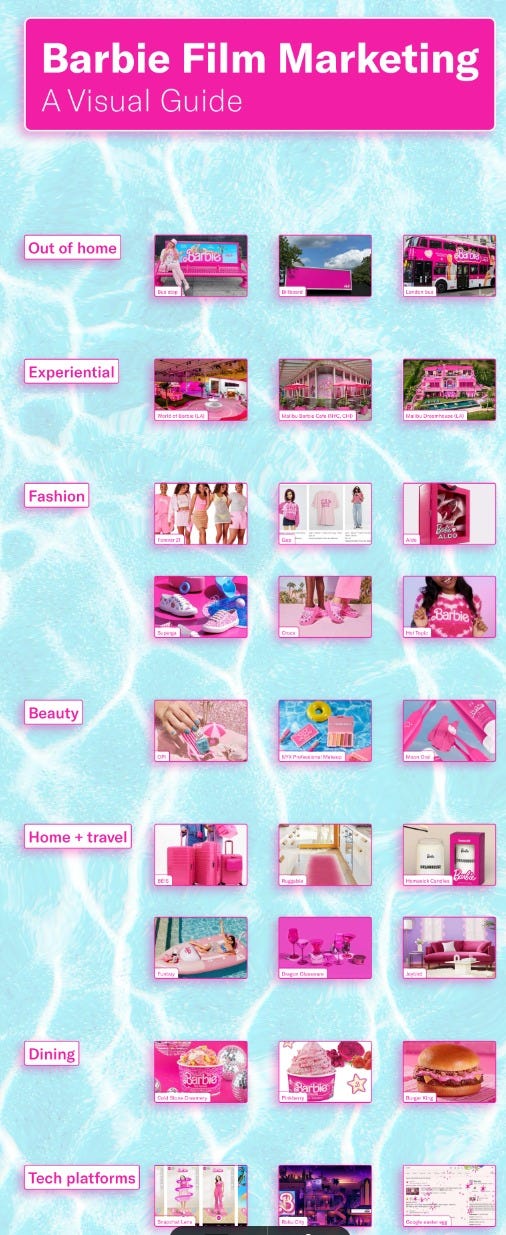Someone took a picture of a pink sunset and thanked the work of the Warner Bros. marketing department.
I won’t say that the Barbie movie is actually irrelevant to its cultural impact and economic success, but the content of the movie is considerably more marginal than it is with most movies, even Marvel Universe epics.1 I argue in my book Meganets that centralized control of systems and culture is becoming increasingly impossible due to the sheer size and speed of the informational networks in play, and so the generation of massive cultural events like the finale of M*A*S*H is becoming more or less impossible. Here we seem to have an exception, but I think it’s better thought of as a limit case.
Barbie's success is a surprising indicator that market saturation bombing can sometimes still work even in today's climate of informational mega-abundance. It's more expensive ($150M spent on marketing, more than the cost of the movie), though, and I'm not sure that the strategy will generalize.
Barbie, the movie, had two unique advantages going in:
Branding an actual color as advertisement
Being a self-compounding lifestyle brand, well beyond a toy
I'm not sure how many movies can claim a single shade of color as advertising in itself. T-Mobile stores likely served as inadvertent advertising for Barbie, since Barbie's copyrighted Pantone 219C (#DA1884) is not so far off from T-Mobile's copyrighted Process Magenta C (#E20074). It’s about as efficient as advertising can get in terms of attention-to-awareness ratio.
Building off of that color, Warner Bros. put a way, way wider marketing strategy into play. Instead of trying to inject one movie into the zeitgeist, they built as much as possible (an entire lifestyle) around a color and a word, and perhaps a few vague signifiers beyond that.

With this much branding, all of it very obviously interlinked (that color again), you do get beneficial feedback effects, and WB and Mattel are reaping the benefits.
Which is to say that the marketing groundwork for the movie was more fertile than most people, including me, had realized, and that it was unusually suited for an informational economy of abundance. That pink punched through a lot of noise. It also means the marketing feat will be hard to replicate for any brand that doesn't have a vast pre-existing legacy, though I expect there will be attempts, and the general focus of blockbusters will move more toward building of multi-platform brands than focusing on the movie itself. Even in Barbie’s case, it’s hard even now to gauge how much of a success the movie is for Warner Bros, rather than for Mattel.
This follows my general argument in Meganets that when you have informational and content abundance, volume, velocity, and virality trump the particularities of any single piece of content. Any individual content, even a $150M movie, is now just too small on its own. Doubling that price with ubiquitous promotion did work in the case of Barbie, but the irony is that it depended on a rare legacy of cultural awareness that does remain in short supply, a relic from the pre-meganet era. Old wine in new bottles.
I haven’t seen the movie. But it’s hard for me to see how this review by quansteli could be wrong: “Barbie, and all Barbie associated products alone are going to make a lot of money for Mattel. Obviously. But the fact that they achieved this feat of business BY telling people that all they care about is money is both commendable and somewhat depressing.”




I just read the piece about "Barbie" and enjoyed it. I refused to see the movie so far, and I am sure that if I did, I would hate it (I hate the idea of it, to begin with, and some of the reasons why can be found in David's piece. When he wrote this, he hadn't seen it either, but his interpretation can stand on its own, without the necessity of watching the movie.)